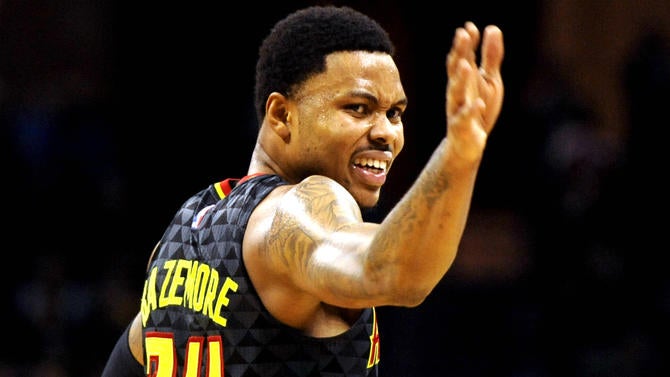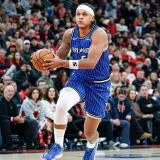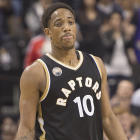2016 NBA Free Agency: Explaining the crazy contracts given out Day 1
Was Mike Conley really a bad deal? Was Solomon Hill an overpay?

The Memphis Grizzlies pledged roughly $250 million on Day 1 of 2016's NBA free agency period. Wing players were getting paid left and right for $15-$18 million per season. Crumbling big men are getting paid as if they were time traveling back to when they had an extra pep in their step.
The spending from NBA teams in the first 24 hours of free agency -- when the league saw a $24 million jump in the salary cap -- has been bewildering. It's hard to know what is and isn't an overpay in the new financial landscape of the NBA. It's difficult to know if a team reached on a player or if this is just the monetary world these players live in now. And before people think this offseason is already off to a crazy start, wait until the salary cap jumps another $20 million or more next summer.
If you don't understand basic economic principles I have no time for your comps of today's contracts vs contracts of yesteryear/diff sports
— JJ Redick (@JJRedick) July 1, 2016
For now, NBA players will defend their earnings and people who don't necessarily understand the supply and demand basics of it all when a surplus of revenue comes into the league will scratch their heads. Of the new money coming in ($720 million in salary cap increase among the 30 teams this summer), the players are still entitled to 51 percent of the Basketball Related Income of the NBA. So as these players continue getting pay increases, remember the owners are pocketing the other 49 percent of that BRI.
With all of that said, there were still some eye-popping deals from the first day. Here are the craziest contracts explained:
1. Mike Conley's deal with Grizzlies: 5 years, $153 million
Why does this seem like a crazy contract? Because a lot of people can't get over the idea of Mike Conley, a zero-time All-Star, getting the richest contract in NBA history. In the final three years of the contract, he'll be making over $30 million per season and will top out at $34 million in the fifth season. He's made one All-NBA Defensive Team (Second) in 2013. The most Michael Jordan made in one season is $33 million back in 1998 when the salary cap was $26.9 million. So how does Conley, who averages 13.6 points over his nine-year career, end up with the biggest salary in NBA history? How will he make 2.5 times what unanimous MVP Stephen Curry will make next season?
How is this actually a sane deal? This is how the market works in a world with a salary cap and max contracts. Conley's max is a percentage of the cap based on his experience in the NBA and includes certain raises negotiated into the Collective Bargaining Agreement. Conley is a top 8-10 point guard in the NBA, an important position in today's league. Put any of these top point guards on the free agent market this summer and they'd get the five-year max offer from their incumbent teams. Conley is one of the best defensive point guards around. He put up 15 points and six assists, despite battling injuries this season, to go along with that defense. If you don't offer up the five-year max to these players, you risk losing them.
Memphis didn't want to lose Conley. That's how he got paid. It's not crazy. It just sounds funny because of the timing. You'll notice almost all of the biggest contracts in NBA history have happened this year.
Largest contracts in NBA history (via @ESPNStatsInfo): pic.twitter.com/lXx7G9eK6q
— Tim MacMahon (@espn_macmahon) July 1, 2016
2. Solomon Hill's deal with Pelicans: 4 years, $52 million
Why does this seem like a crazy contract? Not exactly a household name. Solomon Hill was such an underwhelming first-round draft pick that this November, the Pacers declined to pick up his rookie contract fourth-year team option back in November. That isn't all that common. Then after scoring 246 points in 868 minutes this season, Hill was given $13 million per season over four seasons by the New Orleans Pelicans. The reason? It might have been the playoffs. He's a career 32.4 percent 3-point shooter and has never shot better than 32.7 percent from deep.
In the last game of the regular season, Hill went 7-of-11 from three. In the playoffs, he went 11-of-19. That's 18-of-30 (60 percent) over his final eight games. Did he all of a sudden learn how to shoot? Probably not. He's a solid defender but not good enough for this kind of money if his jumper is broken.
How is this actually a sane deal? I ... don't know. I guess if he's learned how to shoot -- enough teams pursued him so they must think he can make it work -- then you can argue that's the going rate for even a low-end 3-and-D guy. This one is insane to me though.
3. Evan Fournier's deal with Magic: 5 years, $85 million
Why does this seem like a crazy contract? More people have probably heard of Evan Fournier over Solomon Hill, but most of that is because he's pretty popular in his native France. But how does he get $85 million? The hard part in justifying this kind of money for Fournier is what else does he do other than score? Over the last two seasons, he has just eight more assists than J.R. Smith and one fewer assist than Andrew Wiggins. He's not a particularly good defender. His career high in scoring is 15.4 points. Is that really worth $17 million per season or 18 percent of the salary cap next season?
How is this actually a sane deal? Shooting is at a premium in this league. Solomon Hill just got $13 million per season because he shot well for two weeks and might be able to do it in the future. Fournier hit 40 percent of his 3-pointers this season and is a career 38.9 percent shooter. The most successful teams of the last two seasons are all good 3-point shooting teams, except for the Oklahoma City Thunder. And Fournier has increased his scoring average by at least three points every season of his career. The NBA likes paying for buckets and Fournier can get them.
4. Timofey Mozgov's deal with Lakers: 4 years, $64 million
Why does this seem like a crazy contract? Did you watch Timofey Mozgov play this year? He went from the Cleveland Cavaliers' secret weapon acquisition in January of last season to being a guy they had to dust off before they inserted him into garbage time in most games. He had his lowest scoring rate in three seasons. He had the worst rebounding and passing seasons since his rookie year. The biggest contribution he gave to the Cavs was a promotion night in which he rode a bear in the ad for it. And this is the guy the Lakers want for the next four years at $16 million per season?
How is this actually a sane deal? Here's my theory: this was not a good season for the Los Angeles Lakers. It's been a rough couple of years but this was so bad that it's possible Mitch Kupchak checked out mentally pretty early and just ignored what was going on around the NBA. If that's the case, all he remembers is Mozgov's incredible run through the playoffs for the Cavs in 2015 when they were within two wins of upsetting the Golden State Warriors in the Finals. Either that or he really believes this was just a fluky season for Mozgov and how bad he was.
5. Joakim Noah's deal with Knicks: 4 years, $72 million
Why does this seem like a crazy contract? Over the last two seasons, Joakim Noah has moved like a string-less marionette on the court. He can't stay healthy, his feet and knees seem to rebel against him when he tries to be the player he once was, and committing four years and that kind of money to a guy who misses half the season every year appears to be risky. Noah can't shoot and backing off of him may take away a lot of the passing angles he can manipulate so well. Bringing Noah in for a stopgap at center isn't a bad idea, but committing so much to him feels like the old irrational spending of the Isiah Thomas days at Madison Square Garden.
How is this actually a sane deal? In theory, he does fit really well. He's only a couple years removed from winning Defensive Player of the Year and finishing top 5 in MVP voting. Put him in an offense with Triangle Offense tenets and he should be able to move the ball better than your point guard. The Knicks need a defensive presence and when he's healthy, he's an incredible defender. And maybe the last two years ended up giving him enough rest and training to be healthy from here on out. Maybe he was able to shake off the wear-and-tear from his days under Tom Thibodeau.
6. DeMar DeRozan's deal with Raptors: 5 years, $139 million
Why does this seem like a crazy contract? Modernity! This is the era of the 3-point shot in the NBA and DeMar DeRozan is not a 3-point shooter. He just had his career best in 3-point shooting by finishing the season at 33.8 percent from deep. League average was 35.4 percent. So his career best effort is 1.6 percent lower than league average. His best field-goal percentage in a postseason was exactly 40 percent. That was the year the Raptors got swept by the Wizards. Other than that, he's shooting like DaJuan Wagner in the playoffs. Until Mike Conley agreed to his deal, DeRozan had the second biggest contract in league history. He's not even the second best shooting guard in the league.
How is this actually a sane deal? DeMar DeRozan is a good scorer, even without the 3-point shot, and he's a solid defender. He may not be a top 2 shooting guard but he's still one of the best at the position, and the Raptors can't just replace him with more minutes and shots to Terrence Ross or Norman Powell. DeRozan is an All-Star twice over, and if the Raptors weren't going to give him the max, somebody else would've. You can't just replace 23 points per game and the constant pressure of putting the opposing defenders in foul trouble by wishing for a cheaper option.
7. Evan Turner's deal with Blazers: 4 years, $70 million
Why does this seem like a crazy contract? He dribbles the life out of the ball, can't shoot a 3-pointer to save his life, and he's now going to start next to C.J. McCollum and Damian Lillard when you don't want the ball in his hands over theirs. It's hard to tell just how good Turner is. He might end up being the Enes Kanter of the wing position in the NBA. He can put up some stats. He can rebound. He also probably hurts you more consistently than he helps you. When you can re-sign Allen Crabbe for a cheaper price, you're going to put Turner ahead of him (assuming you re-sign Crabbe anyway) and probably stunt his growth and opportunities. And why? For Evan Turner? Neil Olshey is trustworthy but this is a confusing fit.
How is this actually a sane deal? Can he be the LaMarcus Aldridge of third option wings on a playoff team? Does that even make sense or have a shred of coherent thought to it? With the star guards spreading the floor, Turner will have that mid-range area he loves so much wide-open. He could do some damage there and he can possibly add consistent wing defense to this team. If he doesn't monopolize the ball too much, he could be a good weapon when staggered with the second unit on the floor.
8. Kent Bazemore re-signs with Atlanta Hawks for four years, $70 million
Why does this seem like a crazy contract? Not a lot of people have heard of Kent Bazemore. For a 3-and-D guy, he's basically a league average 3-point shooter. He averaged 11 points per game, doesn't get a lot of steals, and while he's a good defender, he still has some work to do on that end of the floor. You could view this contract as the Hawks being afraid to let someone go or gambling that you need to have a 3-and-D guy so you just pay any of them crazy money because that's what it takes.
How is this actually a sane deal? Bazemore has developed immensely in his two years with the Hawks. This is the potential the Warriors saw in him years ago, but didn't have the patience to keep around as they chased playoff depth. Bazemore can improve even more as a shooter and get closer to 38-39 percent. You're not paying for what Bazemore has done so far. You're paying for what you'll continue to develop him into.


















